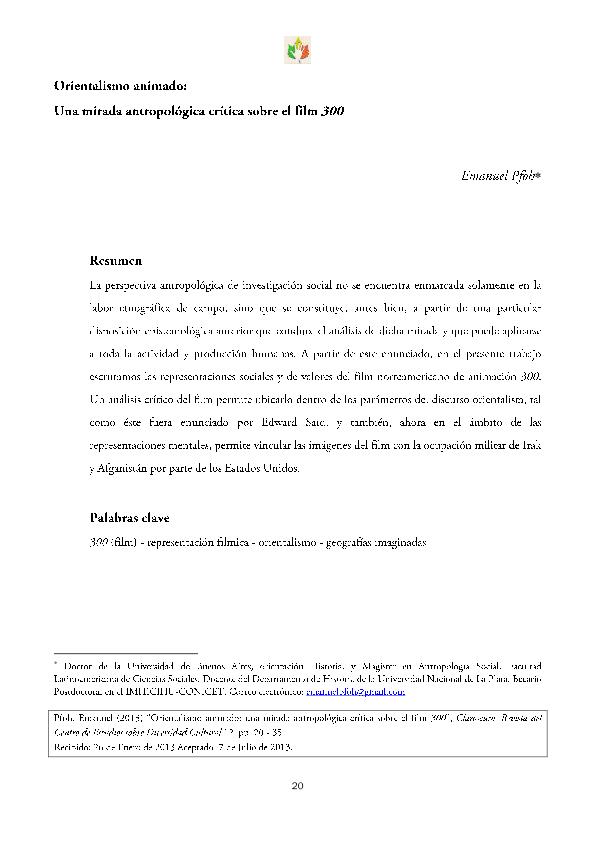Artículo
La perspectiva antropológica de investigación social no se encuentra enmarcada solamente en la labor etnográfica de campo, sino que se constituye, antes bien, a partir de una particular disposición epistemológica anterior que conduce el análisis de dicha mirada y que puede aplicarse a toda la actividad y producción humanas. A partir de este enunciado, en el presente trabajo escrutamos las representaciones sociales y de valores del film norteamericano de animación 300. Un análisis crítico del film permite ubicarlo dentro de los parámetros del discurso orientalista, tal como éste fuera enunciado por Edward Said, y también, ahora en el ámbito de las representaciones mentales, permite vincular las imágenes del film con la ocupación militar de Irak y Afganistán por parte de los Estados Unidos The anthropological perspective of social research is not only attached to the realm of the ethnographic fieldwork. It is rather founded in a previous particular epistemological outlook, which leads such analytical research further and allows for an interpretation of any human activity and production. Building on this statement, in the present paper a critical view of the American animation film 300 and its social representations and ethics is offered. A sound analysis of the film shows its orientalist bias, in the specific manner argued by Edward Said; furthermore, and now on the realm of mental representations, it is possible to link the film’s images to the US military occupation of Irak and Afghanistan.
Orientalismo animado: Una mirada antropológica crítica sobre el film 300
Fecha de publicación:
12/2013
Editorial:
Universidad Nacional de Rosario. Facultad de Humanidades y Artes. Centro de Estudios de la Diversidad Cultural
Revista:
Claroscuro
ISSN:
2314-0542
e-ISSN:
1666-1842
Idioma:
Español
Tipo de recurso:
Artículo publicado
Clasificación temática:
Resumen
Palabras clave:
300 (Film)
,
Representación Fílmica
,
Orientalismo
,
Geografías Imaginadas
Archivos asociados
Licencia
Identificadores
Colecciones
Articulos(CCT - LA PLATA)
Articulos de CTRO.CIENTIFICO TECNOL.CONICET - LA PLATA
Articulos de CTRO.CIENTIFICO TECNOL.CONICET - LA PLATA
Articulos(IMHICIHU)
Articulos de INST.MULTIDISCIP.DE HISTORIA Y CS.HUMANAS
Articulos de INST.MULTIDISCIP.DE HISTORIA Y CS.HUMANAS
Citación
Pfoh, Emanuel Oreste; Orientalismo animado: Una mirada antropológica crítica sobre el film 300; Universidad Nacional de Rosario. Facultad de Humanidades y Artes. Centro de Estudios de la Diversidad Cultural; Claroscuro; 12; 12-2013; 20-35
Compartir




